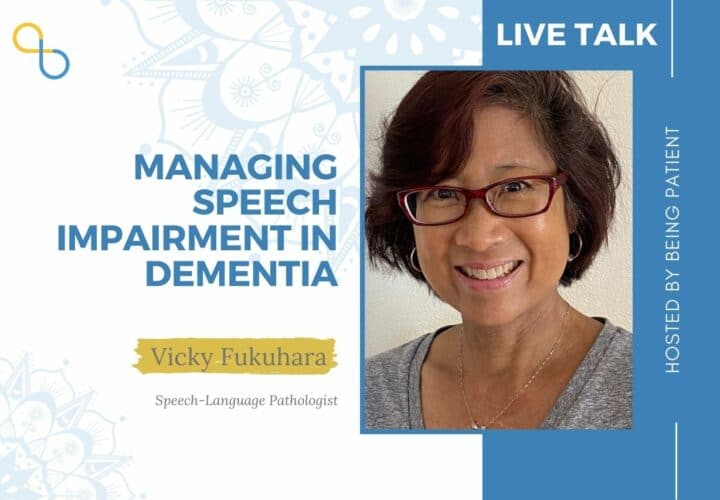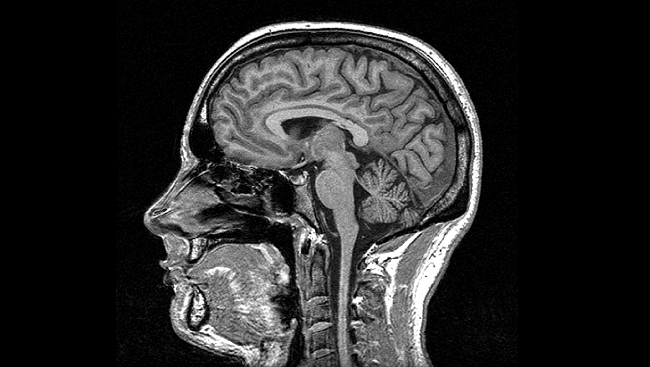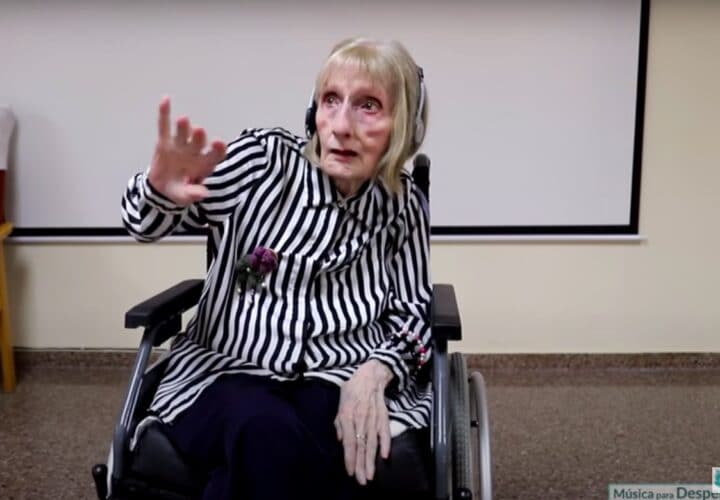Speech-language pathologist Vicky Fukuhara discusses strategies to help people with dementia cope with declining language abilities.
Difficulty communicating is among the earliest symptoms of dementia. People may begin having a hard time finding words in a conversation, and as the illness progresses, language ability often deteriorates. People can forget the names of loved ones, experience trouble forming sentences, or use incorrect words or phrases. Being Patient spoke with speech-language pathologist Vicky Fukuhara about how speech therapy can help address the language impairment of people living with dementia.
- Speech-language pathologists can provide tools and techniques to help caregivers and patients to cope with linguistic impairments.
- Drawing, music, hand gestures and verbal cues are among the strategies employed.
- Fukuhara encourages her patients to stay physically and cognitively active, regardless of their diagnosis.
Being Patient: How do you generally approach speech therapy with patients who have dementia?
Vicky Fukuhara: I tend to gravitate to whatever their strengths are. So I start with what they are good at. What way did they learn best before? Was it visual or auditory? They’ll sometimes tell me, “I never took notes. Back in the days, I just memorized everything.” That tells me maybe they were best verbally and we we try to streamline therapy that way, and also tie in the visuals, because there are weaknesses as things progress. And, what do they like? Do they like electronics? Some just don’t. So, we start with paper and pencil, and go from there.
Being Patient: Do you use art in any ways?
Vicky Fukuhara: Drawing therapy is very underused. I don’t know why. I think we just forget it’s available to us. I love drawing therapy. I’m not an artist. First thing I tell patients is, “Don’t worry about it.” Surprisingly enough, oftentimes drawing can be very intact, especially at the beginning part of the progression and some of them surprise themselves at what they can draw. It indirectly may bring out more language. So I love doing art, I love doing graphics with color. It helps patients also know that there are creative and colorful sides that we can tap into.
Being Patient: Is music helpful?
Vicky Fukuhara: Music brings back memories. It brings back good feelings. It can also facilitate language. Depending on the stage of dementia, music is a great way to bring out conversation, “Do you remember when we danced to that song?” If they can sing along, music is verbal, movement and memory enhancing.
Being Patient: Could asking questions in certain ways help patients find words?
Vicky Fukuhara: When patients freeze up and can’t get a word like ‘apple’ out, they get frustrated.
I go through questions, “What room is it in?”
“It’s in the kitchen. It’s on the table.” [the patient replies.]
“Is it food?” [I ask.]
“Yup.” [the patient replies.]
That also gives the listener context, instead of a wide open window of ‘I don’t know what the word is.’ Usually you can narrow it down fairly quickly if your questioning is on target. It really helps lessen everybody’s frustration. That’s one of the first things I do is I teach the caregivers and the patients how to break that down a little bit, and maybe in the process they come up with the word themselves.
Being Patient: How about hand gestures?
Vicky Fukuhara: Our hands are great communicators and we don’t oftentimes use them. I encourage my patients to use their hands. They can gesture for the apple much faster than they can get the word out, and therefore they don’t have to do the contextual cueing. They can just try it and maybe the process of doing the motion will bring out the [word].
Being Patient: Do you address patients’ memory impairement?
Vicky Fukuhara: Right away, we start working on, “What system can we put into place that’ll help you get through your day better? Should you need a calendar in the wallboard up there that tells you what they’re doing today, or do we need something more sophisticated like your smartphone or Alexa?”
That’s what I usually zero in on right away when I’m dealing with a memory weakness with patients. I just try to set up something right away and something that would be useful on a day to day basis.
Being Patient: Do you give patients exercises to do at home?
Vicky Fukuhara: I often give homework, worksheets for them to work on. They seem to enjoy it and the caregivers can either assist or sometimes if they’re independent, they can do it on their own. It’s extra exercise, extra cognitive stimulation for them.
I also recommend apps sometimes, depending on their level of difficulty. Apps are great if patients have access to iPads, smartphones, etc.. There’s a lot of apps out there. Some are good and some are not so good. But one of the very popular ones — and I have no affiliations with any of these companies — for naming is Tactus.
Be aware that it depends on the level of where the patient is at. It can be way too hard or way too simple. Go with what your speech-language pathologist recommends, if you have one.
And, I usually give a generic recommendation, “Let’s work on using gestures more with your family and have the family support that. So there’s usually a homework assignment, whether written or verbal.
Being Patient: What are some the common misconceptions of speech therapy?
Vicky Fukuhara: A lot of people don’t know what we do. They think of speech therapy or speech pathology as school-based therapists working on speech production or with language learning in children. But they don’t really realize what we do from a neurological standpoint: attention, memory, word finding.
The other misconception is once you say dementia and Alzheimer’s, it’s a daunting term and I’ve heard even some doctors say, “Speech pathologists can’t do anything for you.”
[That’s] not true. We can bring to the table some tools for the family and the patient. I don’t want the terms of dementia and Alzheimer’s to automatically disclude therapy.
Being Patient: Do you have any broad recommendations for patients?
Vicky Fukuhara: No matter what their diagnosis is, I always recommend my patients to stay active. No matter what you can or can’t do physically or cognitively or even verbally, just stay active. Don’t sit by and let everything pass you by. Stay physically active, take walks, do your garden and if you can’t stand for periods of time, get a chair out there and sit down and still enjoy what you have always enjoyed.
Be cognitively engaged: do little puzzles, do crosswords, do word search puzzles. If you’re into numbers, Sudoku is a good one. Drawing, complicated coloring books are great for attention and creativity. Keep a consistent schedule so that patients know, “Every Monday morning I do this, every Tuesday morning I go here or I’m doing this.” Consistency in one’s life is so important.
The interview has been edited for length and clarity.
Contact Nicholas Chan at nicholas@beingpatient.com



